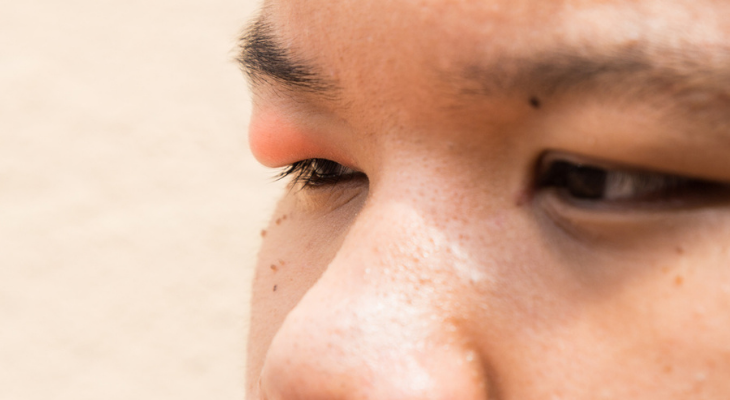
What Causes a Swollen Eyelid?
Looking in the mirror first thing in the morning can be a shocking experience when you have a swollen eyelid. Whether you have a small bump or your eyelid is completely swollen, you're probably wondering what caused the swelling. These conditions are often to blame for swollen eyelids:
Allergies
Allergies might be the reason for the swelling in your eyelids. Allergic reactions occur when your immune system gets a little confused and begins to attack pollen, ragweed, animal dander, dust, and other harmless substances. Your body tries to get rid of these substances by releasing chemicals called histamines. Unfortunately, the release of histamines triggers inflammation and swelling, which is the reason that your nose runs or your eyelids look puffy. If you have a runny nose, nasal congestion, and itchy, watery eyes in addition to eyelid swelling, allergies could be the reason for the change in your appearance.
Stye
A painful red bump at the base of your eyelid could be caused by a stye. Styles happen when you have an infection in an oil gland at the base of your eyelid or in the follicle (sac) that holds your eyelash. In some cases, the inflammation from the infection can cause swelling in your entire eyelid. Other stye symptoms can include watery eyes, light sensitivity, crusty eyelids, or a feeling that something is stuck in your eye.
Chalazion
A chalazion can also cause a red bump or swollen eyelid. The bump appears when an oil gland in your eyelid becomes clogged. A chalazion isn't usually painful but may feel sore if it becomes infected.
Blepharitis
Blepharitis is a common cause of eyelid swelling. If you have blepharitis, you may notice that your eyes are watery and sting or burn. Other symptoms may include:
- Sensitivity to light
- Dry eyes
- Itching
- The feeling that something is stuck in your eye
- Crusty or flaky eyelids
The condition occurs when the oil glands in your eyelid become inflamed. You may be more likely to develop blepharitis if you have allergies, oily skin, rosacea, or dandruff, according to the National Eye Institute.
Conjunctivitis
Commonly called "pink eye," conjunctivitis causes inflammation in the conjunctiva, the layer of tissue that lines the insides of your eyelids and covers the whites of your eyes. Conjunctivitis can be caused by a virus or bacteria. If you wear contact lenses, your swollen eyelid may be due to giant papillary conjunctivitis. This condition causes bumps under your eyelids due to allergies to contact lenses, solutions, or protein deposits. Contact lens wearers who also have allergies or asthma are more likely to develop giant papillary conjunctivitis, according to the American Academy of Ophthalmology.
Graves' Eye Disease
Eyelid swelling might be related to Graves' eye disease. The eye disease affects about 50 percent of people who have Grave's disease, an autoimmune condition caused by an overactive thyroid gland, according to the American Thyroid Association. Other symptoms of Graves' eye disease may include bulging eyes, dry or watery eyes, double vision, light sensitivity, or a feeling that something is stuck in your eye.
Cellulitis
This bacterial infection can affect the eyelids or the tissues around the eyes. Cellulitis is a serious infection that can cause vision loss, meningitis, or a brain abscess if not treated promptly. If you have cellulitis, you may experience swelling, eye pain, bulging eyes, difficulty moving your eyes, or vision changes.
What to Do If You Have a Swollen Eyelid
Luckily, most swollen eyelids soon get better with a little home treatment. Depending on the cause of the swelling, one of these suggestions may be helpful.
- Use Compresses. Use a warm compress to open clogged oil glands, or try a cold compress to decrease inflammation, swelling, and relieve allergy symptoms. Place a washcloth under warm or cool water, wring out excess water, and put the cloth on your eyelid for 10 to 15 minutes. Compresses can be used throughout the day to improve your symptoms.
- Take Out Your Contact Lenses. It's always a good idea to wear your glasses if your eyes are red, painful, or swollen. Keeping your contacts out for a few days may help inflammation subside and relieve swelling.
- See Your Optometrist. Call your eye doctor if eyelid swelling is accompanied by eye pain, trouble moving your eye, fever, discharge, vision changes, or if your eye doesn't improve after a few days of home treatment.
Worried about a swollen eyelid? Give our office a call.
Sources:
American Academy of Ophthalmology: Giant Papillary Conjunctivitis, 5/18/2021
WebMD: Swollen Eyelid, 4/16/2020
All About Vision: Swollen Eyelid Causes & How to Treat a Swollen Eyelid, 7/2021
American Academy of Ophthalmology: What Are Styes and Chalazia?, 11/18/2021


